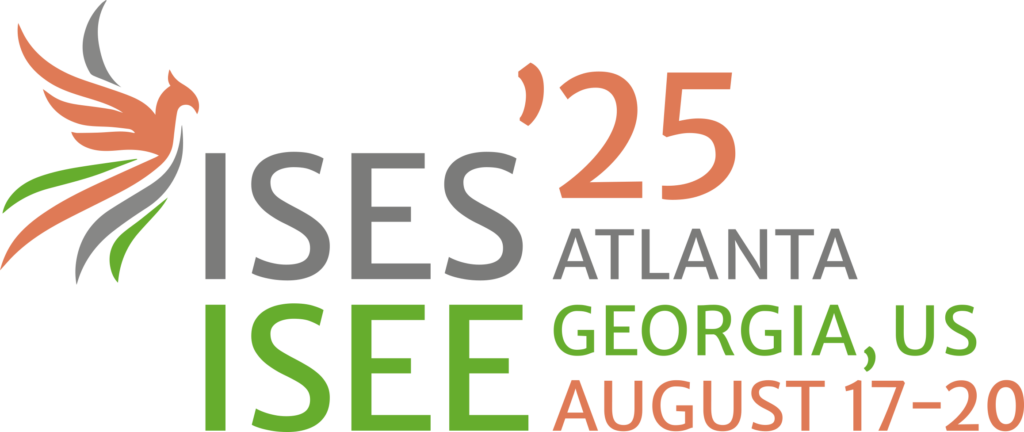Travel Awards
ISES and ISEE are delighted to continue their traditional annual awards also at their joint meeting. The annual awards recognize significant long-term contributions to the field, early-career and mid-career scientists.
Additionally, the hosting societies are dedicated to support delegates with limited funds to travel to Atlanta and still participate in the congress to benefit from its insightful program and convenient networking opportunities.
Deadline to submit the full travel award application is March 4, 2025 March 12, 2025 (23:59 EDT).
Award application is possible in line with the abstract submission.
Along with the notification about their symposium proposal, authors of symposium proposals have been informed about how to submit travel award applications in line with their symposium presentation.
ISES-ISEE General Award Policies and Requirements:
- All travel awards are strictly non-transferable to any other individual in any form.
- Each individual can only receive one travel award. Award applications to both societies are permitted, but recipients can only accept one award if selected for multiple awards.
- ISES and ISEE maintain separate award processes, with measures in place to prevent double awards before the award notifications.
- As always awards will be given based on available funding.
ISES Travel Awards:
- The ISES annual meetings are inclusive of scientists from around the world. The ISES Conference Travel Awards are established to further support students, new researchers, and scientists from Low/Lower-middle income countries*, and/or those who are from under-represented backgrounds in the exposure science community.
- These awards will include a monetary amount to be applied to meeting registrations and a two-year ISES membership. In addition, for applicants from low-income countries, additional funds may be available to cover some parts of the travel expenses.
- All travel expense funds will be distributed to the awardees on-site at the conference.
- The applicant must be the presenter of their submitted abstract and be participating in the conference in person.
- Selection criteria include quality of abstract, financial need, and interest, commitment, and contributions to exposure science.
* The World Bank classifies countries and regions into four income groups: Low, Lower-middle, Upper-middle, and High-income. in the World Development Report. A list of countries considered as “Low” or “Lower-middle” income can be found here.
**Per ISES ethics policies, ISES awards are strictly non-transferable. Any attempt to transfer an award to another individual will result in sanctions imposed by ISES on both the original applicant and the intended transfer recipient.
ISEE Travel Awards:
- ISEE has several different travel awards which can cover expenses such as:
- Conference registration fee waiver;
- Lodging accommodations for up to 5 nights, arranged directly by conference organizers;
- Reasonable economy-class airfare to/from the conference host country. Travel will be booked by a designated travel agency after the recipient obtains their visa. Layovers must be of reasonable length (ideally <24 hours) if direct flights are unavailable. The specific maximum funding amount for travel will be listed on the website.
- Conference registration fee waiver;
*ISEE has caps on flight fares for travel awards which are set by region. For this meeting the caps are:
- Africa: $2,000
- LAC: $1,700
- AWPC: $2,000
- USA: $500
- Eastern Mediterranean: $2,000
- Europe: $1,500
- Canada/Mexico: $800
ISEE Travel Awards are limited to current ISEE members. The applicant must be the presenter of their submitted abstract and be participating in the conference in person. Exceptions may be made if the participant cannot travel due to extenuating circumstances. Volunteers of the society and student and new researcher (SNRN) members are especially encouraged to apply.
This travel award was created in Dr. Dan Wartenberg’s memory to support conference attendees with projects involving communities and stakeholders in grappling with environmental or occupational health issues. Dan was widely recognized for his scholarship, but he found great satisfaction in working with community members and stakeholders in defining their goals and advising on approaches to attain them. Attendees with projects including participatory elements are especially welcome to apply
Scholarships funded by the NIEHS will be provided to young investigators, students, and promising scientists from the US and developing countries. To apply, the applicant will provide, in addition to the details of their country, race, ethnicity, and student/new investigator status, information on their reason for applying, including potential availability of funds to cover travel expenses.
Travel awards supported through HEI are open to all conference participants and will support in-person conference participation. The applicant must be the presenter of their submitted abstract.
Travel awards supported through HEEDS are open to all conference participants and will support in-person conference participation. The applicant must be the presenter of their submitted abstract.
How to apply:
Travel award application is possible in line with abstract submission on the abstract submission platform.
After you have submitted your abstract and clicked on ‘Apply changes and check your contribution’ you must tick the ‘Award – CA’ box in the ‘Author Permissions and Award Application’ section. Then, you must ‘Save submission’.
Once you have accepted the terms and conditions, you can apply for an award by clicking on ‘Your award application’ in the menu on the left.
You must indicate the interest in submitting a travel award application in your abstract submission within the abstract submission deadline. The full application may then be submitted until March 12, 2025.
Along with the notification about their symposium proposal, authors of symposium proposals have been informed about how to submit travel award applications in line with their symposium presentation.

